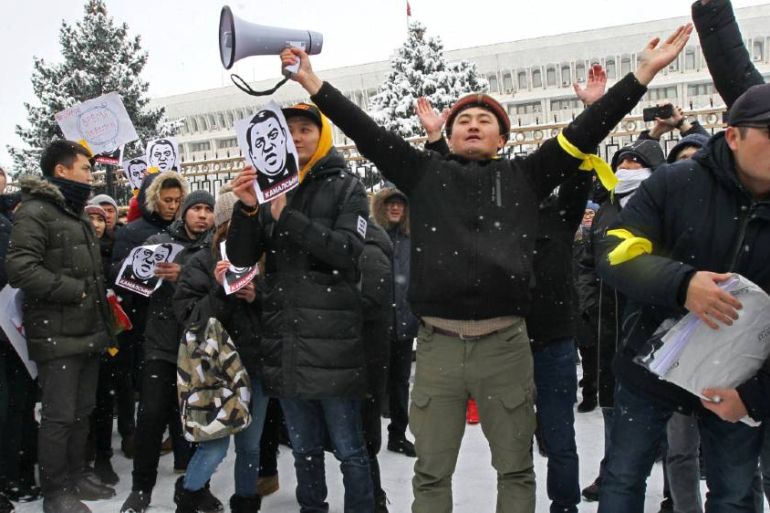Kyrgyzstan court unfreezes accounts of critical media outlets
Radio Free Europe and others had published allegations of a $1bn embezzlement scheme.

A court in Kyrgyzstan has unfrozen the accounts of several media outlets that had been blocked after they published allegations of a nearly one-billion-dollar embezzlement scheme implicating senior officials, one of the outlets said.
The US-funded Radio Free Europe/Radio Liberty (RFE/RL) said a court in the capital, Bishkek, had accepted a motion to unfreeze its bank accounts as well as those of the local news site, Kloop.
Keep reading
list of 3 itemsEnding statelessness: Kyrgyz man honoured for his efforts
Detained Kyrgyz ex-President was ‘plotting coup’
An influential family at the heart of a corruption scandal had earlier filed a libel suit against them, and the media outlets earlier this week received notification of court rulings blocking their accounts.
RFE/RL and the other outlets in late November published claims that a well-connected Chinese-born businessman had spirited away up to one billion dollars with the help of senior figures in the Kyrgyz customs service.
|
|
RFE/RL’s Kyrgyz service Azattyk carried out the investigation with Kloop, and a summary was published by independent news website 24.kg – all of whom were named in the defamation case.
The source for the story, another Chinese-born businessman, was shot dead in Turkey in early November.
Hundreds of people marched in protest in Bishkek following the initial reports, in an expression of outrage at persistent corruption in the poor Central Asian nation.
RFE/RL chief Jamie Fly had called the freezing of their bank accounts an “outrageous assault” on the independence of its Kyrgyz service and demanded that the funds be released.
He said the ruling went against the explicit promise of President Sooronbai Jeenbekov to respect media freedom.
Jeenbekov had called the court decision freezing the accounts “a blow not just to the image of the Kyrgyz president, who publicly extols the principles of freedom of speech everywhere, but to our democratic country”, according to a statement on the presidency’s website.
Corruption
In a separate case a week ago, two former prime ministers were sentenced to long jail terms on corruption charges in a trial that roiled the national elite and fuelled suspicion towards China.
Sapar Isakov, who headed Kyrgyzstan’s government from 2017 to 2018, was handed a 15-year prison term, while Jantoro Satybaldiyev, who filled the role from 2012 to 2014, received a seven-and-a-half-year sentence by a court in Bishkek.
The pair were among eight defendants on trial over a nearly $400m China-financed deal for modernising a power plant.
The power plant, which services the capital, where nearly a million people live, broke down during the winter of 2018, after the project had been completed.
Isakov, 42, was an ally of 63-year-old former President Almazbek Atambayev who fell out with Jeenbekov not long after his one-time protege replaced him in 2017.
Atambayev, 63, is himself currently jailed on corruption charges and is a suspect in more than a dozen other crimes, some relating to a violent standoff between his supporters and law enforcement that left one officer dead in August.
Political infighting has provided the background to the high profile power plant trial which concluded last Friday, but proceedings also raised questions about how Chinese companies operate on Kyrgyz territory across the border.
Prosecutors said that Chinese contractor Tebian Electric Apparatus (TBEA) secured the $400m deal to modernise the ageing facility thanks to Isakov’s lobbying and in spite of a rival bid being cheaper.
Isakov argued that TBEA was awarded the contract because China’s state-owned Exim bank made it a condition for its financing of the project.
No representative of either TBEA or Exim Bank appeared at the trial.
Among other defendants, a former head of the state energy holding was handed a 15-year sentence while two former ministers were slapped with fines.
The court heard that a number of items procured for the modernisation were purchased at inflated prices, including a pair of pliers for $600.